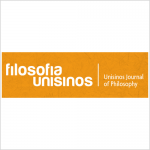Brain as agent and conscious mind as action guide: from Libet-style experiments to necessary conditions for free will
Vol. 22. N.1 (2021): Jan-Apr • Filosofia Unisinos - Unisinos Journal of Philosophy
Autor: Jonas Gonçalves Coelho
Resumo:
Muitos experimentos neurocientíficos, baseados no monitoramento da atividade cerebral, sugerem que é possível predizer as intenções/escolhas/decisões de um agente antes que ele mesmo as conheça. Alguns neurocientistas e filósofos interpretam os resultados desses experimentos dizendo que o livre-arbítrio é uma ilusão, visto que é o cérebro e não a mente consciente que intenciona/escolhe/decide. Assumindo que os métodos e resultados desses experimentos são confiá- veis a questão que se coloca é se eles realmente mostram que o livre-arbítrio é uma ilusão. Para tratar desse problema, argumento que primeiramente é necessário responder três questões referentes à relação entre mente consciente e cé- rebro: 1. Eventos cerebrais causam eventos conscientes? 2. Eventos conscientes causam eventos cerebrais? 3. Quem é o agente, isto é, que intenciona/escolhe/decide conscientemente, a mente consciente, o cérebro ou ambos? Respondo essas questões argumentando que a mente consciente é uma propriedade do cérebro devido à qual o cérebro tem a capacidade causal de interagir adaptativamente com seu corpo e, através deste, com o ambiente físico e sociocultural. Em outras palavras, o cérebro é o agente e a mente consciente, em suas várias formas - cognitiva, volitiva e emocional - e conteúdos, é seu guia de ação. Fundamentado nessa visão geral, argumento que os experimentos acima mencionados não demonstram que o livre-arbítrio é uma ilusão, e proponho, a partir de situações exemplares, o que acredito serem algumas das condições necessárias para o livre-arbítrio.
Abstract:
Many neuroscientific experiments, based on monitoring brain activity, suggest that it is pos- sible to predict the conscious intention/choice/decision of an agent before he himself knows that. Some neuroscientists and philosophers interpret the results of these experiments as showing that free will is an illusion, since it is the brain and not the conscious mind that intends/chooses/decides. Assuming that the methods and results of these experiments are reliable the question is if they really show that free will is an illusion. To address this problem, I argue that first it is needed to answer three questions related to the relationship between conscious mind and brain: 1. Do brain events cause conscious events? 2. Do conscious events cause brain events? 3. Who is the agent, that is, who consciously intends/chooses/ decides, the conscious mind, the brain, or both? I answer these questions by arguing that the conscious mind is a property of the brain due to which the brain has the causal capacity to interact adaptively with its body, and trough the body, with the physical and sociocultural environment. In other words, the brain is the agent and the conscious mind, in its various forms - cognitive, volitional and emotional - and contents, is its guide of action. Based on this general view I argue that the experiments aforementioned do not show that free will is an illusion, and as a starting point for examining this problem I point out, from some exem- plary situations, what I believe to be some of the necessary conditions for free will.
ISSN: 1984-8234
DOI: 10.4013/fsu.2021.221.09
Texto Completo: http://revistas.unisinos.br/index.php/filosofia/article/view/fsu.2021.221.09/60748406
Palavras-Chave: Cérebro agente, mente consciente, livre-arbítrio, experimentos estilo-Libet.

Filosofia Unisinos - Unisinos Journal of Philosophy
The journal Filosofia Unisinos - Unisinos Journal of Philosophy is published once every four months by Universidade do Vale do Rio dos Sinos.
Articles must be original, unpublished, and not under consideration for publication anywhere else and can be written in Portuguese, English or Spanish
Filosofia Unisinos - Unisinos Journal of Philosophy prints articles, translations and critical book reviews. It also reprints papers that are considered fundamental to the area when authorized written permission is given by the original publisher.
